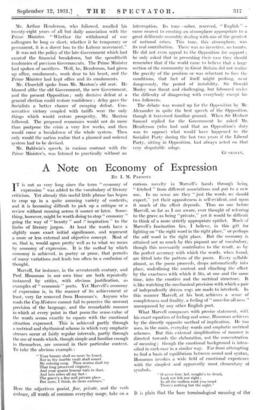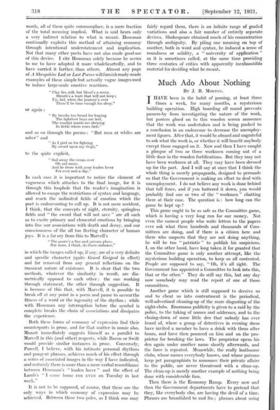A Note on Economy of Expression By I. M. PARSONS
IT is not so very long since the term " economy of expression " was added to the vocabulary of literary criticism. Yet already this useful little phrase has begun to crop up in a quite amusing variety of contexts, and it is becoming difficult to pick up a critique or a review without running across it sooner or later. Some- thing, however, might be worth doing to stop " economy " going the way of " beauty " and inspiration " to the limbo of literary jargon. At least the words have a slightly more exact initial significance, and represent a more or less external and objective concept. Most of us, that is, would agree pretty well as to what we mean by economy of expression. It is the method by which economy is achieved, in poetry or prose, that permits of many variations and leads too often to a confusion of thought.
Marvell, for instance, in the seventeenth century, and Prof. Housman in our own time are both repeatedly instanced by critics, with obvious justification, as examples of " economic " poets. Yet Marvell's economy of expression is, in the manner of its achievement at least, very far removed from Housman's. Anyone who reads the Coy Mistress cannot fail to perceive the unusual precision of the language, and the remarkable manner in which at every point in that poem the sense-value of the words seems exactly to equate with the emotional situation expressed. This is achieved partly through a metrical and rhythmical scheme in which very emphatic stresses occur at fairly regular intervals, partly through the use of words which, though simple and familiar enough in themselves, are unusual in their particular context. To take the obvious example :
" Your beauty shall no more be found, Nor in thy marble vault shall sound My echoing song. Then worms shall try That long preserved virginity, And your quaint honour turn to dust, And into ashes all my lust : The grave's a fine and private place But none, I think, do there embrace."
Here the adjectives quaint, fine, private, and the verb embrace, all words of common everyday usage, take on a curious novelty in Marvell's hands through being " fetched " from different associations and put to a new use. In no sense arc they " just the words we should expect," yet their appositeness is self-evident, and upon it much of the effect depends. Thus no one before Marvell, so far as I am aware, ever thought of referring to the grave as being "private," yet it would be difficult to think of a more strictly appropriate epithet. Much of Marvel's fascination lies, I believe, in this gift for lighting on "the right word in the right place," or perhaps the odd word in the right place. But the economy is attained not so much by this piquant use of vocabulary, though this necessarily contributes to the result, as by the perfect accuracy with which the words, when found, arc fitted into the pattern of the poem. Every syllable almost, as the poem proceeds, drops automatically into place, underlining the content and clinching the effect by the exactness with which it fits, at one and the same time, into the emotive and the metrical structure. It is like watching the mechanical precision with which a pair of independently driven cogs are made to interlock. In this manner Marvell, at his best, achieves a sense of completeness and finality, a feeling of " once-for-all-ness " unsurpassed by any other English poet.
What Marvell compasses with precise statement, with, his exact equation of feeling and sense, Housman achieves by the directly opposite method of implication. He too uses, in the main, everyday words and emphatic metrical schemes. But this external simplification of manner is directed towards the elaboration, not the concentration of meaning ; though the emotional background is inten- sified in each ease in a similar way. Far from attempting to find a basis of equilibrium between sound and syntax, Housman invokes a wide field of emotional experience with the simplest and apparently most elementary of symbols.
" 0 never fear, lad, nought's to dread, Look not left nor right ; In all the endless road you tread There's nothing but the night."
It is plain that the bare terminological meaning of the words, all of them quite commonplace, is a mere fraction of the total meaning implied. What is said bears only a very indirect relation to what is meant. Housman continually exploits this method of attaining economy through intentional understatement and implication. Not that many other poets have not also made good use of this device. I cite Housman solely because he seems to me to have adopted it more wholeheartedly, and to have carried it farther, than others. Almost any page of A Shropshire Lad or Last Poems will furnish ready-made examples of these simple but actually vague images used to induce large-scale emotive reactions.
" Clay lies still, but blood's a rover, Breath's a ware that will not keep ; Up, lad, when the journey's over There'll be time enough for sleep."
or again :
" By brooks too broad for leaping The lightfoot boys are laid, The roselipt maids are sleeping In fields where roses fade."
and so on through the poems : "But men at whiles are sober" and
" As I gird on for fighting My sword upon my thigh,"
to the quite explicit,
" Sail away the ocean over Oh sail away, And lie there with your leaden lover For ever and a day."
In each case it is important to notice the element of vagueness which attaches to the final image, for it is through this loophole that the reader's imagination is allowed to escape the restrictions of syntax and language, and reach the unlimited fields of emotion which the poet is endeavouring to call up. It is not mere accident, I think, that the concepts of night, eternity, springless fields and " the sword that will not save " are all such as to excite primary and elemental emotions by bringing into line our associations with death and decay, and our consciousness of the all too fleeting character of human joys. It is a far cry from this to Marvell's
"The grave's a fine and private place, But none, I think, do there embrace,"
in which the images called up, if any, are of a very definite and specific character (quite Grand Guignol in effect) and far removed from any general reflections on the transient nature of existence. It is clear that the two methods, whatever the similarity in result, are dia- metrically opposed to each other : the one working through statement, the other through suggestion. It is because of this that, with Marvell, it is possible to break off at any point in a poem and pause to savour the fitness of a word or the ingenuity of the rhythm ; while with Housman any interruption before the symbol is complete breaks the chain of associations and dissipates the experience.
Both these forms of economy of expression find their Counterparts in prose, and for that matter in music also. Mozart immediately suggests himself as a parallel to Man-ell in this (and other) respects, while Bacon or Swift would provide similar instances in prose. Conversely, Purcell, I believe, with his intimate personal rhythms and pungent phrases, achieves much of his effect through a series of associated images in the way I have indicated, and certainly there is more than a mere verbal resemblance between Housman's " leaden lover " and the effect of Lamb's " I came home FOR EVER on Tuesday in last week."
It is not to be supposed, of course, that these are the only ways in which economy of expression may be achieved. Between these two poles, as I think one may fairly regard them, there is an infinite range of graded variations and also a fair number of entirely separate devices. Shakespeare obtained much of his concentration through ambiguity. By piling one meaning on top of another, both in word and syntax, he induced a sense of roundness or solidity, a " university of application " as it is sometimes called, at the same time providing three centuries of critics with apparently inexhaustible material for deciding what he meant.































 Previous page
Previous page